Related Research Articles
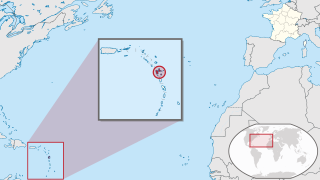
Guadeloupe is an overseas department and region of France in the Caribbean. It consists of six inhabited islands—Basse-Terre, Grande-Terre, Marie-Galante, La Désirade, and two Îles des Saintes—as well as many uninhabited islands and outcroppings. It is south of Antigua and Barbuda and Montserrat and north of Dominica. The capital city is Basse-Terre, on the southern west coast of Basse-Terre Island; the most populous city is Les Abymes and the main centre of business is neighbouring Pointe-à-Pitre, both on Grande-Terre Island. It had a population of 395,726 in 2024.

Martinique is an island in the Lesser Antilles of the West Indies, in the eastern Caribbean Sea. A part of the French West Indies (Antilles), Martinique is an overseas department and region and a single territorial collectivity of the French Republic. It is a part of the European Union as an outermost region within the special territories of members of the European Economic Area, and an associate member of the CARICOM, but is not part of the Schengen Area or the European Union Customs Union. The currency in use is the euro.

The French West Indies or French Antilles are the parts of France located in the Antilles islands of the Caribbean:
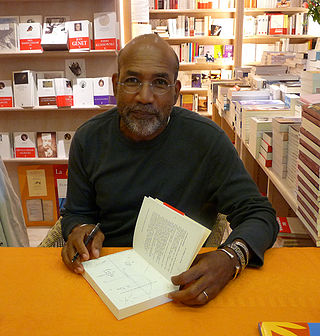
Patrick Chamoiseau is a French author from Martinique known for his work in the créolité movement. His work spans a variety of forms and genres, including novels, essays, children's books, screenplays, theatre and comics. His novel Texaco was awarded the Prix Goncourt in 1992.
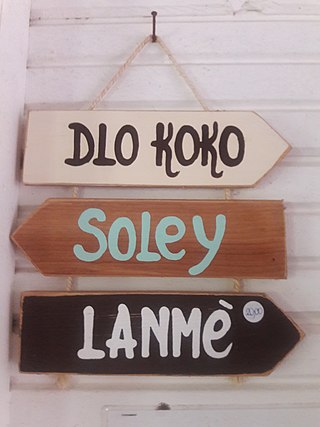
Antillean Creole is a French-based creole that is primarily spoken in the Lesser Antilles. Its grammar and vocabulary include elements of French, Carib, English, and African languages.
Kassav', also alternatively spelled Kassav, is a French Caribbean band that originated from Guadeloupe in 1979. The band's musical style is rooted in the Guadeloupean gwoka rhythm, as well as the Martinican tibwa and Mendé rhythms. Regarded as one of the most influential bands in 20th-century French West Indies music, Kassav is often credited with pioneering the zouk musical genre. Their musical evolution is a synthesis of cadence-lypso and compas traditions.

The culture of Dominica is formed by the inhabitants of the Commonwealth of Dominica. Dominica is home to a wide range of people. Although it was historically occupied by several native tribes, it was the Taíno and Island Caribs (Kalinago) tribes that remained by the time European settlers reached the island. "Massacre" is a name of a river dedicated to the murders of the native villagers by both French and British settlers, because the river "ran red with blood for days." Each claimed the island and imported slaves from Africa. The remaining Caribs now live on a 3,700-acre (15 km2) Carib Territory on the east coast of the island. They elect their own chief.

A French creole, or French-based creole language, is a creole for which French is the lexifier. Most often this lexifier is not modern French but rather a 17th- or 18th-century koiné of French from Paris, the French Atlantic harbors, and the nascent French colonies. This article also contains information on French pidgin languages, contact languages that lack native speakers.

The Îles des Saintes, also known as Les Saintes, is a group of small islands in the archipelago of Guadeloupe, an overseas department of France. It is part of the Canton of Trois-Rivières and is divided into two communes: Terre-de-Haut and Terre-de-Bas. It is in the arrondissement of Basse-Terre and also in Guadeloupe's 4th constituency.

As an overseas department of France, Martinique's culture is French, African and Caribbean. Its former capital, Saint-Pierre, was often referred to as the Paris of the Lesser Antilles. The official language is French, although many Martinicans speak a Creole patois. Based in French, Martinique's Creole also incorporates elements of English, Spanish, Portuguese, and African languages. Originally passed down through oral storytelling traditions, it continues to be used more often in speech than in writing.
"Haïti Chérie" is a traditional patriotic song of Haiti of a poem written by Othello Bayard that was initially called it Souvenir d'Haïti and composed to music in 1925. It is widely considered as a second national anthem, and one of Haiti's most famous méringues.

Christy Campbell, known by the stage name Admiral T, is a French singer, rapper, songwriter, DJ, and actor. He is one of the most popular and successful Guadeloupean singers. He is also a designer and the creator of the clothing trademark WOK LINE.
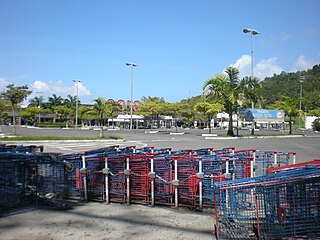
The 2009 French Caribbean general strikes began in the French overseas region of Guadeloupe on 20 January 2009, and spread to neighbouring Martinique on 5 February 2009. Both islands are located in the Lesser Antilles of the Caribbean. The general strikes began over the cost of living, the prices of basic commodities, including fuel and food, and demands for an increase in the monthly salaries of low income workers.
Élie Domota is a trade union leader from Guadeloupe, spokesman of Liyannaj Kont Pwofitasyon or LKP and general secretary of the UGTG, the main trade union in Guadeloupe. He was the leading figure in the general strike in Guadeloupe which started on January 20, 2009.

The languages of the Caribbean reflect the region's diverse history and culture. There are six official languages spoken in the Caribbean:
Zoreille is a Réunion Creole term to describe French people who were born in Metropolitan France and reside on the island of Réunion. It contrasts with the terms Petits Blancs(fr) and Gros Blancs(fr), which refer to the descendants of earlier European settlers. It is one of the ethnic groups of Réunion, but the term is also used in New Caledonia, French Polynesia, the Lesser Antilles, and Mauritius.
Sylviane Telchid was a Guadeloupean writer, translator and professor of French and Antillean Creole.
Jacques Adélaïde-Merlande is a French historian, born on 1 June 1933 in Fort-de-France, Martinique. A former lecturer at the University of the West Indies and Guyana, of which he was president from 1972 to 1977, he is the current president of the Guadeloupe Historical Society.
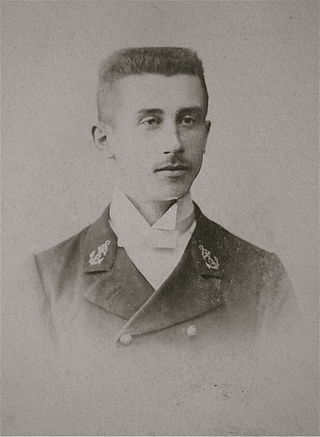
Georges Robert was an officer of the French Navy, as well as a civil administrator. He ended his military career with the rank of admiral. He is mainly known for his role as High Commissioner of the Vichy regime for the French overseas territories of the Western Atlantic.
Martinican literature is primarily written in French or Creole and draws upon influences from African, French and Indigenous traditions, as well as from various other cultures represented in Martinique. The development of literature in Martinique is linked to that of other parts of the French Caribbean but has its own distinct historical context and characteristics.
References
- ↑ Du Neg nwe au Beke Goyave, le langage de la couleur de la peau en Martinique, Isabelle Michelot Archived 2011-10-06 at the Wayback Machine « Il est composé du complément du nom -péyi (signifiant local) en construction directe sans connotation économique, par opposition au Béké (où le sème de "riche" est dominant) et au petit blanc (où le sème "pauvre" est dominant), appellation méprisante du blanc qui n’a pas réussi économiquement »
- ↑ La Rue Case-Nègres de Joseph Zobel
- 1 2 "Blacks slam white minority in Martinique strike". International Herald Tribune . Associated Press. 2009-02-13. Retrieved 2009-02-16.
- ↑ Shatz, Adam (2024). The Rebel's Clinic: The Revolutionary Lives of Frantz Fanon. London, U.K.: Head of Zeus. p. 26. ISBN 9-781035-900046.
The békés 's enthusiasm for Pétain's national revolution was hardly surprising: they were seeking to restore their power.